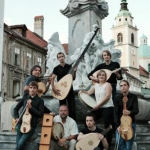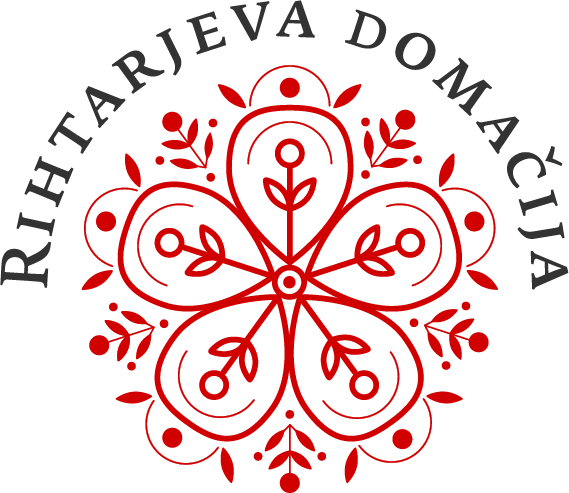Nova Schola Labacensis (SI)
Tadeja Pance, soprano
Urška Kastelic, soprano
Ana Novak, soprano
Nadia Magister, mezzo-soprano as a guest
Blažka Mraz, recorder
Tomaž Šinigoj, violin, viola
Miha Šinigoj, cello
Boris Šinigoj, Romantic guitar

Ticket order:
Access: transport
da
Artists’ message to visitors: Schubert's music always moves and uplifts the soul. Undoubtedly, it reaches its most intimate moment in the form of songs for solo voice as well as in some lyrically composed polyphonic songs for female voices with a gentle Romantic guitar accompaniment. They address us straight to the heart with the finely tuned singing verses of German-speaking Romantic poets. Lyrically conceived instrumental intermezzi with an inspiring interweaving of melodious recorder, gentle strings and Romantic guitar help them to create an unforgettable evening of Schubert's chamber music, a true Schubertiade.
The mission statement of the ensemble: With our concert, we want to preserve and testify for a high spiritual culture by performing timeless pearls of musical tradition in our spiritually poor times. These gems certainly include Schubert's well-known and lesser-known songs for solo voice as well as rare lyric polyphonic songs for female voices, which we want to revive in their intimate original form with gentle Romantic guitar accompaniment. At the same time, with a chamber ensemble consisting of recorder, strings, and Romantic guitar, we would also like to draw attention to the rarely performed instrumental works of some Romantic contemporaries, which once inspired Schubert himself.
Recording: Radio Slovenija
Winemaker of Seviqc Brežice 2023 concerts: Family winery Jakončič, Kozana, Goriška Brda
Catering: Društvo Ostrnice Stari trg pri Ložu
Event programme
Schubertiade: An Die Musik
Franz Peter Schubert, Heinrich August Marschner, Václav Tomáš Matějka
The concert programme consists of a historically faithful revival of the so-called Schubertiade, an evening concert of songs accompanied with a romantic guitar and of instrumental compositions by Franz Peter Schubert and his contemporaries Ivan Eugen Padovac, Václav Tomáš Matějka and Heinrich August Marschner from the turn of the 18th and 19th centuries. Along with four young extremely talented sopranos and mezzosoprano accompanied by a Romantic guitar, Nova Schola Labacensis also features excellent soloists on recorder, violin, viola, and cello.
Franz Peter Schubert (1797-1828)
Zwei Walzer
Ständchen (*)
Lob der Thränen
Moment musicaux, No. 3
Die Nacht
Ständchen (*)
XV (**)
III (**)
VI Trauer Walzer (**)
IX (**)
An die Musik
Am Meer (*)
*******
Václav Tomáš Matějka (1773-1830)
Notturno op. 25
Marcia
Franz Peter Schubert (1797-1828)
Meeres Stille
Der Tod und das Mädchen
Heinrich August Marschner (1795-1861)
Bagatele 8, op. 4
Franz Peter Schubert (1797-1828)
Klage um Ali Bey
Das Leben ist ein Traum
Die junge Nonne
(*) An unknown legacy from the turn of the 19th and 20th centuries from the former Srednja glasbena in baletna šola Ljubljana library
(**) Original Tänze für Flöte oder Violine und Gitarre
Although the name of Franz Peter Schubert is sufficiently well known and recognized among classical music lovers today, and unfortunately only post festum, has it established itself in the general cultural consciousness of mankind as the name of one of the greatest composers from the Romantic period, it will not be out of place if we dedicate something to him in the introduction lines that connect it with our cultural and musical space. Like many musical geniuses before him, Franz Peter Schubert did not receive real recognition for his life outside of his close circle of friends, and until the end of his prematurely ended life, he struggled with material problems that he could not have overcome without the help of his relatives and friends. When he tried to get regular employment, he was always unsuccessful, not least when he applied to become a music teacher here in Ljubljana, which at the time was called with the hard German name Laibach. Hence, it is no coincidence that after a long and hard selection of candidates, despite the recommendation of the Viennese court composer Antonio Salieri, he was ultimately indifferently rejected and another, undoubtedly less talented and creative candidate was chosen, whose name soon sank into oblivion.
Despite the fact that today this may arouse indignant astonishment or at least regret in us, Franz Peter Schubert thus, according to God's providence, nevertheless preserved the most precious, namely artistic freedom, which allowed him to create so many superb musical works, from astonishingly poetic solos, choral compositions, solo piano pearls and exceptional chamber works for string quartet, piano quintet and other ensembles to operas, sacred works and symphonies, the most famous of which is the so-called Unfinished. This two-movement symphony, not only with the deeply felt suffering of life's troubles, but with its very name, reflects a romantic understanding of the artistic and spiritual pregnancy of the fragment and, last but not least, of life itself, which cannot in any way end in this world, because, like every great art, music Franz Peter Schubert's last intuition extends into transcendence towards the final union with the Creator and eternal peace of mind.
With a thoughtful selection of the most beautiful and highly representative songs by Franz Peter Schubert, accompanied by romantic guitar, which form the core of the present concert program, titled after one of them, An die Musik (Music), we want to present a more intimate version of the famous composer's soliloquies, which are usually performed with a piano accompaniment. Not only have many of them been preserved in the recording with a typical romantic guitar accompaniment, to which they liked to sing together even in the composer's closest circle of friends, but some, such as the gently chosen lyrical soliloquy Die Nacht (Night), exist only in this more intimate form, i.e., with the refined sound of guitar strings.
Therefore, it is no coincidence that the artistic portraits of Franz Peter Schubert with a romantic guitar in his hands, which were then liked to be printed on postcards for lovers and friends to send to each other as a sign of mutual loyalty and affection, have maintained their popularity to this day. Portrait from under the brush of Fr. Ullreich for example, shows the young composer plucking guitar strings while listening to the church bells on the mighty double bell tower of the local parish church, which rises majestically into the blue sky in the background. Still another from the brush of Otto Nowak depicts Franz Peter Schubert singing to the guitar, surrounded by admiring and delighted ladies, enthusiastic friends, and acquaintances in the calm evening atmosphere of a middle-class salon in intimate music by candlelight, named after the composer's surname Schubertiade.
In the composer's selected solos, which are presented this time accompanied by an extremely high-quality original romantic guitar from Schubert's time, the composer set to music the inspired lyrical texts of some of the most famous romantic poets, such as Johann Wolfgang Goethe (Meeres Stille - Sea Silence), Heinrich Heine (Am Meer - By the Sea) and August Wilhelm Schlegel (Lob der Tränen – Hymn of a Tear), as well as less well-known, but no less inspiring, such as Ludwig Rellstab (the popular Stāndchen – Window), Caroline Pichler (Die Nacht – Night), Franz Adolf Friedrich von Schober (An die Musik - The Music), Johann Christoph Wannovius (Das Leben ist ein Traum - Life is a Dream), Jakob Nikolaus Craigher de Jachelutta (Die junge Nonne - The Young Nun), Matthias Claudius (Der Tod und das Mādchen - Death and the girl; Klage um Ali Bey – The lawsuit for Ali Bey). Finally, among the lyrical texts set to music, we even find a German rendition of selected verses from the play Cymbeline King by William Shakespeare, from the pen of Abraham Voß, also titled (Stāndchen - Window), to which Johann Anton Friedrich Reil, at the initiative of Anton Diabelli, added two more of Shakespeare's lyrical poems related author's stanzas.
To the singing verses of Franz Peter Schubert's inspired soliloquies for soprano or mezzo-soprano solo and romantic guitar, performed by all four of our extremely talented young female soloists, we have added some exceptional gems in the form of the composer's lesser-known and rarely performed polyphonic songs for female trio. This consists either of three sopranos or of two sopranos and a mezzo-soprano, as foreseen by the performance of the romantically playful and tenderly inspired with youthful longing of the trio Das Leben ist ein Traum – Life is a dream and, for the geopolitically detached Viennese bourgeois milieu, a surprisingly poignant mourning for the Egyptian Ali Klage um Ali Bey - A lawsuit for Ali Bey, in which both people and crocodiles cry inconsolably for this Mamluk leader and warlord who died tragically in Schubert's time and was extremely popular among the native Egyptian people. Finally, in the final part of the evening, the fiery rambling soliloquy in an arrangement for three lyrical sopranos, romantic guitar and cello, Die junge Nonne - The young nun, which, in the dramatic experience of stunning beauty and lively events in nature, surprisingly mirrors the rapturous vortex of stormy mental emotions that young the nun is finally lifted into a soothing spiritual closeness and union with the chosen Bridegroom.
Between all these romantically refined, emotionally varied and spiritually elevated singing compositions by Franz Peter Schubert, chamber instrumental intermezzi are interwoven like gentle violets, in which, in addition to selected composer's original dances for (recorder) flute and/or violin with guitar accompaniment, in the facsimile edition of his colleague, music publisher, pianist and composer Anton Diabelli also added some newer arrangements of the author's popular piano works, such as Moment musicaux no. 3 and two Waltz. Exceptionally, we have also included in our Schubertiade the spiritually extremely similar compositions of two of Franz Peter Schubert's contemporaries, namely the movement Marcia from Notturno op. 25 by the Vienna-based Czech guitarist Václav Tomáš Matějka for recorder, viola, cello and romantic guitar, and the lyrically lively Bagatelle no. 8, op. 4 for solo romantic guitar in the German-speaking area by the once extremely popular opera composer and guitarist Heinrich August Marschner.
Radio Slovenija, Program Ars, Banchetto musicale
Banchetto musicale is a broadcast in which we focus on concert recordings of music from an earlier date on the Ars program. In it, we listen to recordings of our central early music festivals - the Radovljica Festival and Seviqc Brežice, as well as foreign concerts performed by renowned artists, experts in the performance of early music.


















